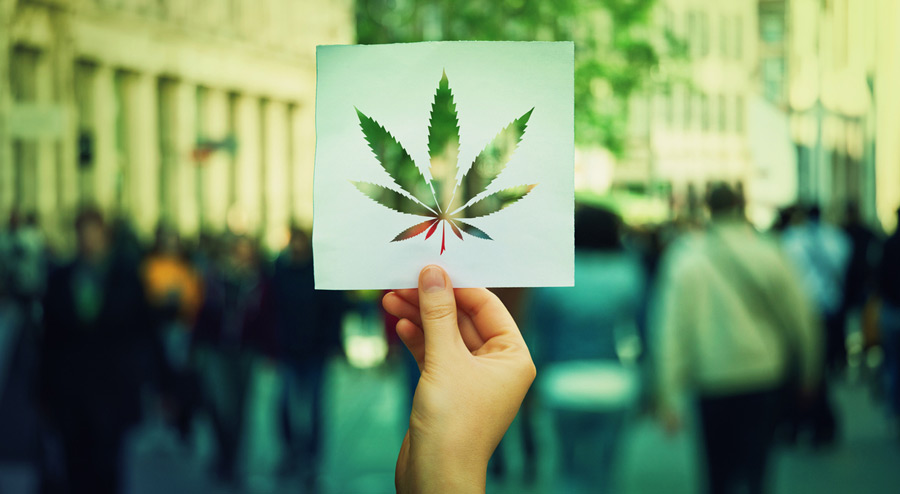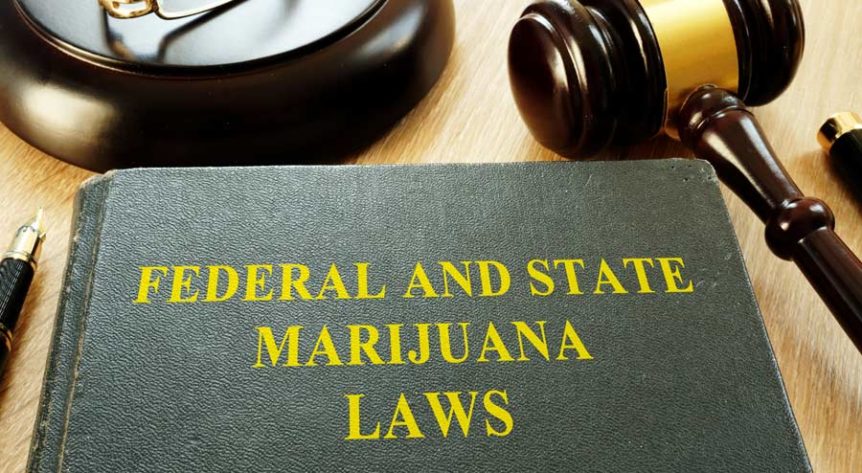State marijuana laws have changed a lot since Colorado and Washington became the first states to legalize weed in 2012. Eight other states have since followed their lead and are seeing first-hand the financial benefits that this booming industry has to offer.
It remains to be seen if federal law will change as more and more states legalize medical cannabis and recreational cannabis. As it stands, the law itself is quite confusing as every state sets its own limits on how much you can legally carry and whether or not you can grow your own plants at home.
Is there a clear-cut path to legal recreational weed? Not exactly, but a lot of the states that now have is started with medicinal marijuana.
How Do States Legalize Recreational Marijuana?
How does recreational weed become legal? It depends. Some states start by approving medical marijuana first then advancing the laws over time. Sometimes, recreational weed is put to the ballot so the people who live in the state can vote on the measure directly while other times the state legislature attempts to pass the measure on its own.
Occasionally, medical marijuana use is approved first. Currently, there are 34 states where medical marijuana is legal: Alaska, Arizona, Arkansas, California, Colorado, Connecticut, Deleware, Florida, Hawaii, Illinois, Louisiana, Maine, Maryland, Massachusetts, Michigan, Minnesota, Missouri, Montana, Nevada, New Hampshire, New Jersey, New Mexico, New York, North Dakota, Ohio, Oklahoma, Oregon, Pennsylvania, Rhode Island, Utah, Vermont, Washington, and West Virginia.
Whether or not these states will eventually allow recreational marijuana remains to be seen but allowing medicinal use often proves to be the first step to changing the law.
What States Have Legal Recreational Weed?

Whether it’s medical or recreational, since 2012, 15 states have allowed the legalization of recreational marijuana but that doesn’t mean the laws are the same in each state. Here’s a list of the states where marijuana legalization has taken place as well as a general summary of each state’s law.
- Alaska. In 2014, recreational weed was legalized in Alaska. The law for marijuana is very similar to laws for alcohol. You have to be 21 or older and present your ID to buy it or have it in your possession, and you can only get it from a licensed dealer. Alaskans can also grow up to six plants at home with three flowering at any one time.
- Arizona. On November 3, 2020, Arizona legalized the recreational use of marijuana through Proposition 207.
- California. In 1996, California became the first state to legalize medical marijuana but it took until 2016 for recreational weed to find its way to the Golden State. Californians can carry up to one ounce of weed, up to eight ounces of concentrated cannabis, and as many as six plants at home.
- Colorado. Colorado was one of the first states to legalize weed back in 2012. Different counties and municipalities are able to pass stricter laws if they prefer but state law permits adults to possess an ounce of marijuana and grow as many as six plants at home.
- Connecticut. In July 2021, Governor Ned Lamont signed into law a bill legalizing the recreational use of marijuana. Individuals aged 21 and over can use up to 1.5 oz. and be in possession of a maximum of 5 oz. in a sealed container at any one time.
- District of Columbia. Recreational marijuana use was legally enacted into law in February 2015 through the Marijuana Legalization and Regulation Act. Adults aged 21 years and up can be in possession of and use up to 2 oz. of the substance. The possession of hash and its derivatives in concentrates remains illegal and is punishable by 180 days behind bars in addition to a $1,000 fine.
- Illinois. On May 31, 2019, the Illinois General Assembly passed the Illinois Cannabis Regulation and Tax Act to legalize recreational marijuana use beginning on January 1, 2020. Adults age 21+ may possess up to 30 grams of marijuana for recreational use.
- Maine. Recreational weed has been legal in Maine since 2016. Residents can have up to 2.5 ounces of marijuana total which can include up to five grams of concentrate. At home, they can have up to six flowering plants as well as 12 immature plants.
- Massachusetts. Recreational pot became legal in Massachusetts in 2016 but is still prohibited on federal or public land. People can have up to 10 ounces at home but quantities over 1 ounce have to be locked up. They can also grow up to six plants at home.
- Michigan. Since late 2018, Michigan has been the only state in the Midwest to approve the legalization of marijuana. Residents can carry up to 2.5 ounces of pot and have as many as 12 plants in their home, as long as they are kept out of the public eye.
- Montana. On November 3, 2020, the state of Montana legalized the recreational use of marijuana through Initiative 190.
- Nevada. State law was changed in 2016. Residents of Nevada can possess up to an ounce of pot or a ⅛ ounce of concentrated pot without law enforcement intervening. They’re also allowed to grow up to six plants per person or 12 plants in each household.
- New Jersey. On November 3, 2020, the state of New Jersey legalized the recreational use of marijuana by referendum. The usable marijuana limit is set to 1 oz per person.
- New Mexico. In June 2021, the bill allowing the recreational use of marijuana in the state was signed into law. The Cannabis Regulation Act makes it legal for adults aged 21 years and over to possess up to 2 oz. of the substance. Cultivation is limited to six plants per person with no more than 12 per household.
- New York. Governor Cuomo signed into law the Marijuana Regulation and Taxation Act on March 31, 2021. The law set the legal age of recreational marijuana use to 21 years and over. Cultivation limits are capped at 12 plants (six mature and six immature) for each household.
- Oregon. Since 2014, Oregon state law allows residents to possess up to one ounce when in public. They can also keep up to eight ounces at home as well as four marijuana plants.
- South Dakota. On November 3, 2020, South Dakota legalized the recreational use of marijuana by referendum.
- Vermont. What’s special about Vermont is that it became the first state where recreational weed was done through the legislature instead of putting a ballot measure directly to the citizens. Since January 2018, residents are allowed to carry up to one ounce of weed. They can also have two mature plants and four seedlings in their homes.
- Virginia. The recreational use, possession, and cultivation of marijuana became legal in the state on July 1, 2021. Adults aged 21 years and older can possess a maximum of 1 oz. of the substance and grow up to four plants total.
- Washington. Like Colorado, Washington state also legalized recreational marijuana in 2012. Adults can buy up to one ounce of marijuana buds. They can also purchase up to 16 ounces of edibles, 72 ounces of liquid form, and 7 grams of concentrates.
Do States Benefit from Legalizing Marijuana?
Yes, the economic benefits for states that have legalized marijuana have been fairly significant. The impact on tax revenue has been particularly significant. In 2015, marijuana sales in Colorado totaled nearly a billion dollars with the state collecting taxes and fees or more than $135 million.
The possibility of this substantial boost in revenue has been the motivation for a lot of states to move ahead with legalization. There are also boosts to the economy in the form of new business and jobs, not only from nurseries and dispensaries but also from secondary businesses needed to service the new industry like developers, construction companies, and marketing and design firms.
It’s also important to think about how much money will be saved by legalizing weed. Drug enforcement costs would go down as would court costs. Plus, because there would be fewer people jailed for marijuana offenses, it would also save money within the prison system.
Looking Toward the Future
There’s no way to say for sure if the rest of the states will follow along and explore legalized weed. It’s also unclear if federal law will ever catch up. That said, there are real economic benefits to legal recreational weed which is why state laws change so rapidly.
